Air Filters Cost Estimator
Air filters are essential components in HVAC systems, ensuring that the air circulating through your building is clean and free of pollutants, dust, and allergens. Whether you’re installing new air filters or replacing existing ones in residential, commercial, or industrial settings, understanding the costs involved is crucial for effective budgeting and planning. Estimate Florida Consulting provides expert cost estimator services to help you plan and execute your air filter installation or replacement project with precision, ensuring that your project stays within budget while meeting all performance and air quality standards.
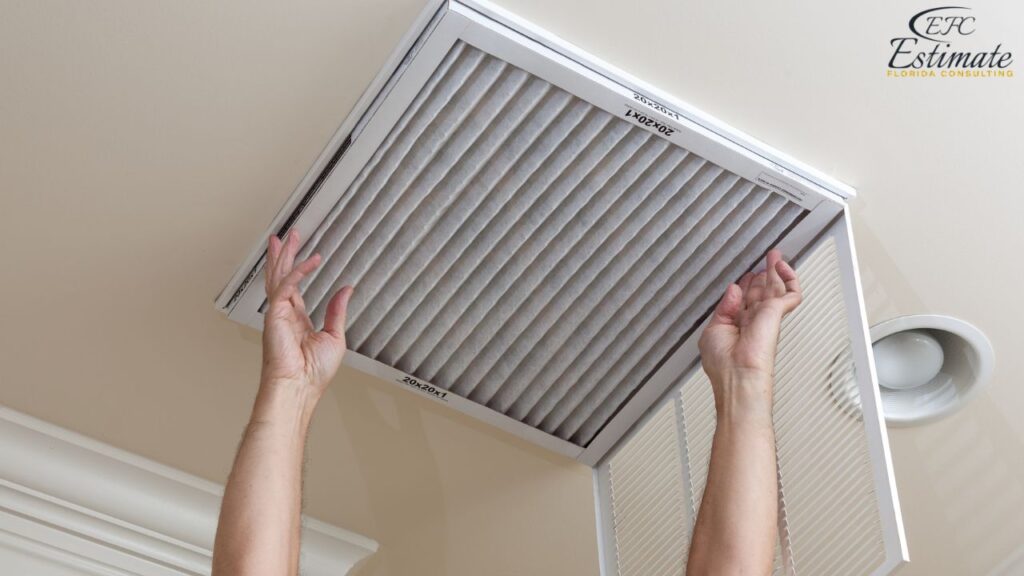
How Much Do Air Filters Installation Cost?
The cost of air filters can vary depending on several factors, including the type of filter, the size, the MERV (Minimum Efficiency Reporting Value) rating, and the frequency of replacement. On average, air filter costs range from $5 to $100 per filter, with specialized filters, such as HEPA filters, costing more. Understanding these costs is essential for effective budgeting and planning, ensuring that your project stays within financial constraints while achieving the desired air quality.
Air Filters Cost by Type
The cost of air filters varies significantly based on the type, efficiency, and size of the filter. Each filter type offers different levels of air filtration, which can influence both the initial costs and long-term operational expenses. Below is a detailed breakdown of common air filter types and their associated costs.
Air Filter Type | Price per Unit (Material Only) | Price per Unit (Installed) |
Fiberglass Filters | $6.50 – $13 | $19.50 – $32.50 |
Pleated Filters | $13 – $39 | $32.50 – $65 |
Electrostatic Filters | $26 – $78 | $52 – $104 |
HEPA Filters | $65 – $130 | $91 – $195 |
Carbon Filters | $19.50 – $65 | $39 – $104 |
Washable Filters | $26 – $78 | $52 – $117 |
UV Filters | $97.50 – $195 | $130 – $260 |
Fiberglass Filters:
Fiberglass filters are the most basic and economical option available on the market. They typically range in price from $6.50 to $13 per unit for the material, with installation costs between $19.50 and $32.50 per unit. These filters are disposable and are designed to capture larger particles such as dust and lint. Because of their lower efficiency, they need to be replaced more frequently, often every 30 days, which can result in higher long-term costs despite their lower initial price. They are most suitable for environments where air quality demands are minimal, but regular maintenance is essential to prevent clogging and inefficiency in the HVAC system.
Pleated Filters:
Offering a step up in filtration efficiency, pleated filters are designed with a larger surface area, allowing them to capture more particles than fiberglass filters. The cost for pleated filters typically ranges from $13 to $39 per unit for the material, with installation costs between $32.50 and $65 per unit. These filters are available in various MERV (Minimum Efficiency Reporting Value) ratings, which determine their effectiveness in filtering out smaller particles. Pleated filters are an excellent choice for households or businesses looking to balance cost and air quality, as they provide better protection against dust, allergens, and other airborne particles while still being relatively affordable.
Electrostatic Filters:
Electrostatic filters use static electricity to attract and trap airborne particles, offering higher efficiency than basic fiberglass or pleated filters. These filters typically cost between $26 and $78 per unit for the material, with installation costs ranging from $52 to $104 per unit. Available in both disposable and washable versions, electrostatic filters are particularly effective at capturing fine particles like pet dander and pollen, making them ideal for households with pets or individuals with allergies. The washable versions, while more expensive upfront, can be cleaned and reused multiple times, offering long-term savings and reduced environmental impact.
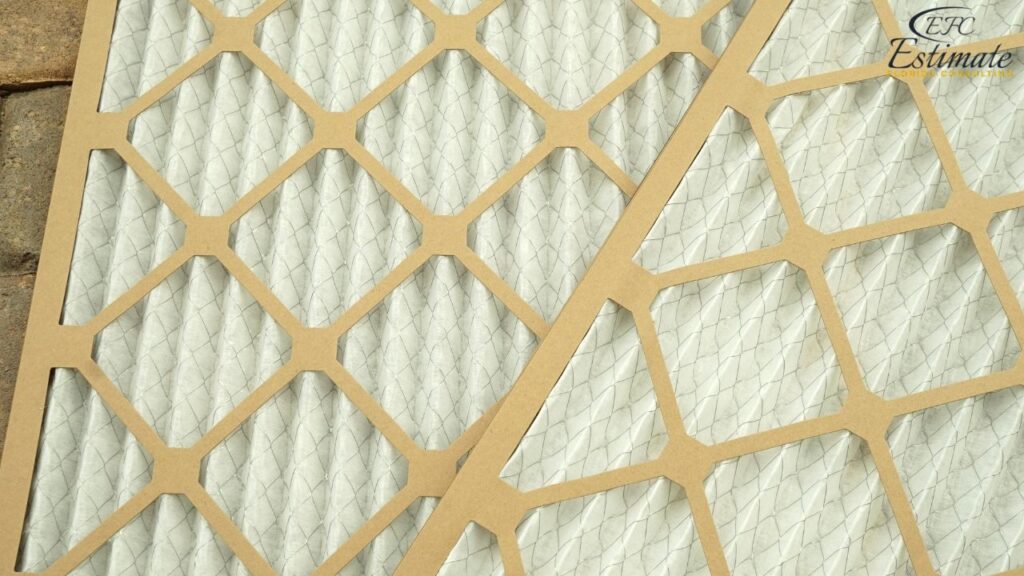
HEPA Filters:
Known for their high efficiency in capturing even the smallest particles, HEPA (High-Efficiency Particulate Air) filters are considered the gold standard in air filtration. They typically cost between $65 and $130 per unit for the material, with installation costs ranging from $91 to $195 per unit. HEPA filters are capable of capturing 99.97% of particles as small as 0.3 microns, including dust, mold spores, and bacteria. These filters are often used in environments where air quality is critical, such as hospitals, laboratories, and homes with individuals suffering from severe allergies or respiratory conditions. Although more expensive, the superior air purification provided by HEPA filters makes them a worthwhile investment for those needing the highest level of air quality.
Carbon Filters:
Carbon filters are specifically designed to remove odors, gases, and volatile organic compounds (VOCs) from the air, in addition to capturing particles. They typically range in price from $19.50 to $65 per unit for the material, with installation costs between $39 and $104 per unit. These filters are often used in conjunction with other types of filters, such as HEPA or pleated filters, to provide comprehensive air purification. Carbon filters are particularly effective in environments where odors and VOCs are a concern, such as homes with smokers, pets, or strong cooking smells. They offer an additional layer of air quality improvement by targeting contaminants that other filters might miss.
Washable Filters:
Washable air filters are a cost-effective and environmentally friendly option, as they can be cleaned and reused multiple times. These filters typically cost between $26 and $78 per unit for the material, with installation costs ranging from $52 to $117 per unit. While washable filters require regular maintenance to ensure they remain effective, their reusable nature can lead to significant long-term savings by reducing the need for frequent replacements. These filters are ideal for homeowners looking to minimize waste and lower their ongoing filter replacement costs while maintaining good air quality.
UV Filters:
UV (Ultraviolet) filters use ultraviolet light to kill bacteria, viruses, and other microorganisms in the air, providing an additional layer of protection beyond particle filtration. The cost of UV filters typically ranges from $97.50 to $195 per unit for the material, with installation costs ranging from $130 to $260 per unit. UV filters are often used in conjunction with other types of filters to enhance indoor air quality, particularly in environments where sterilization is important, such as healthcare facilities or homes with immunocompromised individuals.
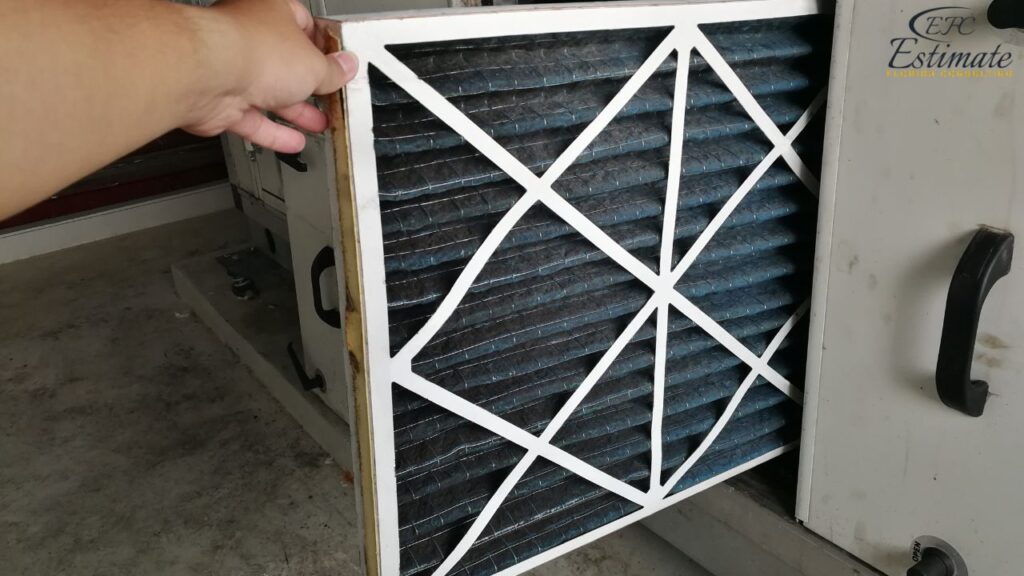
While UV filters are more expensive, they offer unique benefits in terms of reducing the spread of airborne pathogens and ensuring a cleaner indoor environment.
Air Filters Cost by Project Type
The overall cost of installing or replacing air filters depends on the specific project type. Each project scenario has unique challenges and cost considerations that should be carefully evaluated to ensure optimal performance and value for money. Below is a summary of different project types and their associated costs.
Project Type | Cost Range |
New Filter Installation | $130 – $650 |
Filter Replacement | $65 – $390 |
Filter Upgrade (Higher Efficiency) | $195 – $780 |
HVAC System Retrofit (Including Filters) | $1,300 – $13,000 |
Whole-House Air Filtration System | $1,950 – $9,750 |
New Filter Installation:
Installing new air filters in an HVAC system typically costs between $130 and $650, depending on the type of filter and the complexity of the installation. New installations might involve modifications to the HVAC system, such as adding filter racks or housing units, to accommodate the filters properly. This cost can vary widely based on the specific requirements of the HVAC system and the number of filters needed. New installations are common in new construction or during significant HVAC upgrades, where ensuring optimal air filtration from the outset is crucial for maintaining indoor air quality and system efficiency.
Filter Replacement:
Replacing old or worn-out air filters is a routine maintenance task that typically costs between $65 and $390, depending on the type of filter and the number of filters being replaced. Regular replacement of air filters is essential for maintaining the efficiency of the HVAC system and ensuring good indoor air quality. The frequency of replacement will depend on factors such as the type of filter, the level of indoor air pollution, and the specific needs of the household or business. While filter replacement is generally a straightforward task, it is important to ensure that the correct filter type and size are used to maintain system performance.
Filter Upgrade (Higher Efficiency):
Upgrading to a higher-efficiency air filter, such as switching from a basic fiberglass filter to a HEPA or electrostatic filter, typically costs between $195 and $780. Upgrading may involve additional modifications to the HVAC system to ensure compatibility with the new filters, such as adjusting fan speeds or installing additional filter housing. Higher-efficiency filters provide better air quality and protection against allergens and other pollutants, but they may also increase the overall cost of the system due to their higher initial price and potential impact on airflow. An upgrade is often worth the investment, particularly in homes with allergy sufferers or in environments where air quality is a top priority.
HVAC System Retrofit (Including Filters):
Retrofitting an existing HVAC system to improve its air filtration capabilities typically costs between $1,300 and $13,000, depending on the scope of the retrofit and the type of filters being installed. A retrofit may involve upgrading the entire system, including ductwork, air handlers, and control systems, to accommodate advanced filtration technologies. This type of project is often undertaken in commercial or industrial settings where enhanced air quality is critical, or in older homes where the existing HVAC system is outdated and no longer meets modern standards. A comprehensive retrofit can significantly improve indoor air quality, energy efficiency, and the overall performance of the HVAC system.
Whole-House Air Filtration System:
Installing a whole-house air filtration system that integrates with the HVAC system typically costs between $1,950 and $9,750. These systems provide comprehensive air purification for the entire home, using multiple stages of filtration, including HEPA filters, carbon filters, and UV filters. Whole-house systems are ideal for homes with individuals who have allergies, asthma, or other respiratory conditions, as they provide superior air quality throughout the living space. The cost of a whole-house system will depend on the complexity of the installation, the size of the home, and the specific filtration technologies used. While more expensive, these systems offer the highest level of protection and air quality for those with special health concerns.
Videos For Mechanical Construction
HVAC Installation
HVAC Upgrade
HVAC Installation
Additional Costs and Considerations
In addition to the primary costs of air filters and their installation, several other factors can influence the total cost of maintaining and upgrading your HVAC system’s air filtration capabilities. These additional costs should be factored into your budget to ensure that your air filtration system operates efficiently and effectively.
Additional Cost | Estimated Cost |
Regular Filter Maintenance | $65 – $195 per year |
Energy Consumption (Higher Efficiency Filters) | $26 – $130 per year |
HVAC System Adjustments (Fan Speed, Airflow) | $260 – $1,300 |
Air Quality Monitoring Devices | $130 – $650 |
Extended Warranty or Service Plan | $130 – $390 per year |
Regular Filter Maintenance:
Regular maintenance of air filters is crucial to ensure they function effectively and provide optimal air quality. The cost of regular filter maintenance typically ranges from $65 to $195 per year, depending on the type of filter and the frequency of replacement. Maintenance tasks may include cleaning washable filters, replacing disposable filters, and inspecting the HVAC system for any issues that could affect air quality. Regular maintenance helps extend the life of the filters and the HVAC system while ensuring that indoor air remains clean and healthy. Investing in routine maintenance can prevent costly repairs and ensure that your HVAC system operates efficiently year-round.
Energy Consumption (Higher Efficiency Filters):
Higher-efficiency air filters, such as HEPA or electrostatic filters, can increase energy consumption due to their denser filtration media, which may restrict airflow. The additional energy costs typically range from $26 to $130 per year, depending on the filter type and the HVAC system’s efficiency. While these filters provide superior air quality, it’s important to consider the potential impact on energy consumption and operating costs. In some cases, adjusting the HVAC system to accommodate the higher-efficiency filters can help mitigate this issue, ensuring that the system continues to operate efficiently without significantly increasing energy bills.
HVAC System Adjustments (Fan Speed, Airflow):
When installing higher-efficiency filters or upgrading the air filtration system, it may be necessary to adjust the HVAC system’s fan speed, airflow settings, or other parameters to ensure optimal performance. The cost of these adjustments typically ranges from $260 to $1,300, depending on the complexity of the system and the specific modifications required. Proper adjustments are crucial to maintaining the efficiency and longevity of the HVAC system while ensuring that the filters provide the desired level of air quality. Failure to make these adjustments could result in reduced system efficiency, increased energy consumption, and potential damage to the HVAC components.
Air Quality Monitoring Devices:
Installing air quality monitoring devices can provide real-time data on indoor air quality, allowing you to track the effectiveness of your air filtration system and make adjustments as needed. The cost of air quality monitoring devices typically ranges from $130 to $650, depending on the features and capabilities of the device. These devices can monitor factors such as particulate matter, humidity, temperature, and VOCs, providing valuable insights into the overall air quality in your home or building. By using air quality monitoring devices, you can ensure that your air filtration system is functioning as intended and make informed decisions about when to replace filters or adjust system settings.
Extended Warranty or Service Plan:
Purchasing an extended warranty or service plan for your HVAC system and air filters can provide peace of mind and protection against unexpected repair costs. The cost of an extended warranty or service plan typically ranges from $130 to $390 per year, depending on the coverage and the provider. These plans may include regular maintenance visits, priority service, and discounts on repairs or replacement parts, helping to ensure that your air filtration system remains in good working order. An extended warranty or service plan can be a wise investment, especially for homeowners who want to avoid the hassle and expense of unexpected HVAC system breakdowns.
Air Filter Costs by Project Scope and Application
Here’s a breakdown of estimated air filter costs by application, providing you with a clear understanding of how different project types impact overall costs:
Application | Estimated Air Filter Cost per Filter | Total Cost Range |
Residential Air Filter Replacement | $5 – $30 | $50 – $500 (depending on size and quantity) |
Commercial Air Filter Replacement | $10 – $50 | $500 – $5,000 (depending on size and quantity) |
Industrial Air Filter Replacement | $20 – $100 | $1,000 – $10,000 (depending on size and quantity) |
HEPA Filter Installation | $30 – $100 | $300 – $5,000 (depending on size and quantity) |
Factors Influencing Air Filter Costs
The cost of air filters can vary widely depending on several factors, including the type of filter, its efficiency rating, the size of the filter, and whether it is disposable or washable. Understanding these factors will help you estimate the total cost of your filtration needs and make informed decisions that align with your budget and specific requirements. Each of these factors plays a significant role in determining the overall expense, and by considering them carefully, you can optimize your investment in air filtration.
Type of Air Filter: Fiberglass, Pleated, HEPA, or Carbon
The type of air filter you choose is one of the most significant factors affecting the overall cost. Different types of filters offer varying levels of efficiency and are suitable for different applications, from basic dust filtration to high-efficiency particle capture. By understanding the differences between filter types, you can select the one that best meets your needs in terms of air quality, cost, and maintenance requirements.
Type of Air Filter | Average Cost per Filter |
Fiberglass Filter | $2 – $10 |
Pleated Filter | $5 – $30 |
HEPA Filter | $15 – $100+ |
Carbon Filter | $10 – $50 |
Fiberglass Filter:
Fiberglass filters are among the most basic and least expensive options, typically costing between $2 and $10 per filter. They are designed for basic dust and debris filtration and are commonly used in residential HVAC systems. However, they have a lower efficiency rating and are not as effective at capturing smaller particles like pollen, pet dander, or mold spores. Fiberglass filters are disposable and need to be replaced frequently, usually every 30 days, to maintain their effectiveness. While they are a cost-effective option for basic filtration needs, their limited performance in capturing finer particles means they may not be the best choice for those with higher air quality requirements.
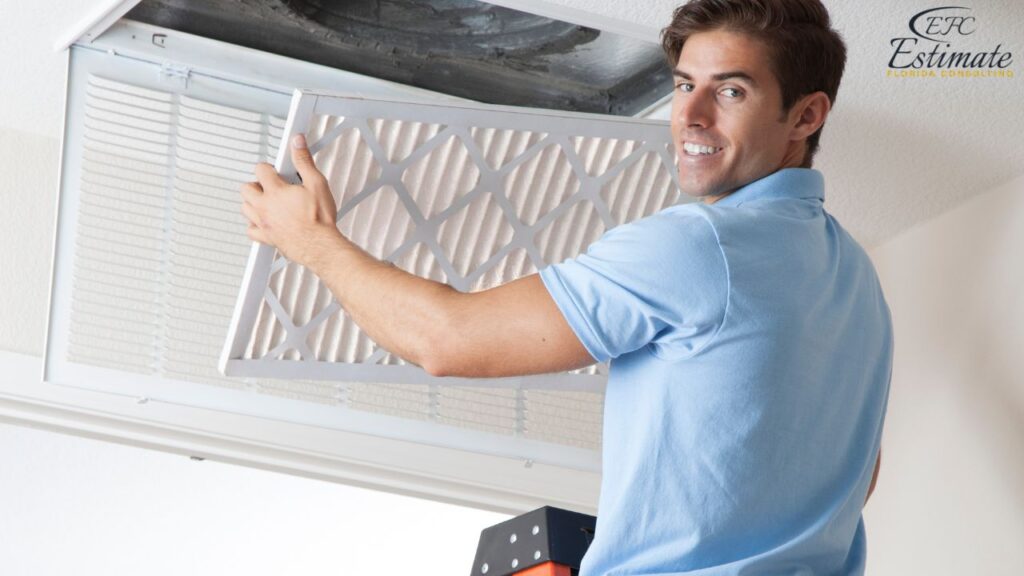
Pleated Filter:
Pleated filters offer a significant improvement in efficiency over fiberglass filters, with prices ranging from $5 to $30 per filter. Made of polyester or cotton, these filters have a greater surface area due to their pleated design, which allows them to capture more particles. Pleated filters are more effective at trapping smaller particles, making them a better choice for those concerned about allergens or indoor air quality. They typically last longer than fiberglass filters, with a replacement schedule of 60 to 90 days, depending on usage and air quality. The higher upfront cost of pleated filters is often offset by their longer lifespan and superior performance in maintaining cleaner air, making them a smart investment for better indoor air quality.
HEPA Filter
High-Efficiency Particulate Air (HEPA) filters are considered the gold standard in air filtration, capable of capturing up to 99.97% of particles as small as 0.3 microns. HEPA filters are commonly used in medical facilities, laboratories, and homes where air quality is a top priority. These filters are more expensive, with costs ranging from $15 to over $100 per filter, depending on the size and brand. HEPA filters are typically used in air purifiers and specialized HVAC systems and may need to be replaced every six months to a year, depending on the environment and usage. The superior filtration capability of HEPA filters makes them an excellent choice for environments that require the highest level of air cleanliness, such as homes with allergy sufferers, cleanrooms, and hospitals.
Carbon Filter:
Carbon filters are designed to remove odors, gases, and volatile organic compounds (VOCs) from the air. These filters use activated carbon to absorb harmful gases and odors, making them ideal for environments where air quality is affected by pollutants like smoke, cooking odors, or chemical fumes. Carbon filters typically cost between $10 and $50 per filter and are often used in conjunction with other types of filters to provide comprehensive air purification. The lifespan of a carbon filter varies but generally requires replacement every three to six months. Carbon filters are especially useful in environments where air quality is compromised by odors or chemicals, providing a targeted solution for improving indoor air.
Efficiency Rating: MERV, MPR, or FPR Ratings
The efficiency rating of an air filter, often measured by MERV (Minimum Efficiency Reporting Value), MPR (Microparticle Performance Rating), or FPR (Filter Performance Rating), also impacts the cost. Filters with higher ratings are more effective at capturing smaller particles, but they are also more expensive.
Understanding these ratings can help you select a filter that balances cost with the level of filtration required for your specific needs.
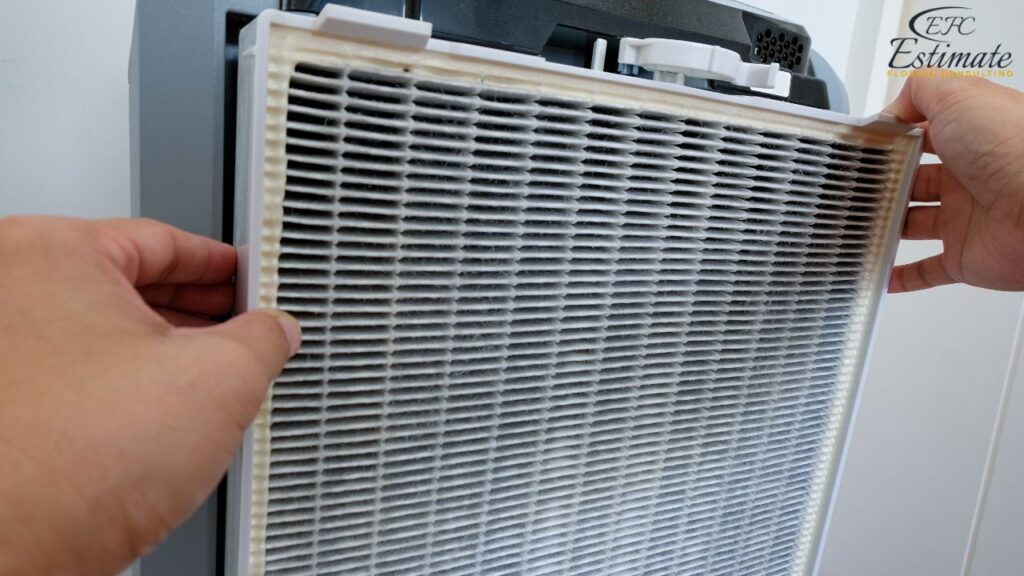
Efficiency Rating (MERV) | Cost Range per Filter |
MERV 1-4 | $2 – $5 |
MERV 5-8 | $5 – $15 |
MERV 9-12 | $10 – $30 |
MERV 13-16 | $20 – $100+ |
MERV 17-20 (HEPA) | $50 – $200+ |
MERV 1-4:
Filters with a MERV rating of 1 to 4 are the most basic and least expensive, typically costing between $2 and $5 per filter. These filters are effective at capturing large particles like dust, lint, and pollen but are not suitable for environments where high air quality is required. While they offer an affordable solution for basic filtration, they may not provide adequate protection against finer particles that can affect indoor air quality, particularly in environments where air purity is crucial.
MERV 5-8:
Filters with a MERV rating of 5 to 8 offer better efficiency, capturing smaller particles such as mold spores and pet dander. These filters cost between $5 and $15 per filter and are commonly used in residential settings where moderate air filtration is needed. They provide a good balance between cost and performance, making them suitable for most homes and small businesses. By upgrading to a filter with a higher MERV rating, you can improve indoor air quality and reduce the presence of allergens and other airborne contaminants.
MERV 9-12:
Filters in the MERV 9 to 12 range are more efficient at capturing fine particles like smoke, bacteria, and fine dust. They are typically used in environments where better air quality is necessary, such as homes with allergy sufferers or small businesses. These filters cost between $10 and $30 per filter. The higher filtration efficiency of these filters makes them an ideal choice for individuals who are particularly sensitive to airborne particles or who live in areas with higher levels of pollution.
MERV 13-16:
High-efficiency filters with a MERV rating of 13 to 16 are capable of capturing very small particles, including viruses and smoke particles. These filters are often used in hospitals, laboratories, and other settings where the highest level of air quality is required. They cost between $20 and $100 or more per filter, depending on the size and brand. Investing in high-MERV filters can significantly enhance air quality, making them a preferred choice for environments where air purity is of utmost importance, such as healthcare facilities and cleanrooms.
MERV 17-20 (HEPA):
HEPA filters, with a MERV rating of 17 to 20, offer the highest level of filtration, capturing particles as small as 0.3 microns with 99.97% efficiency. These filters are used in critical environments like cleanrooms, medical facilities, and high-end air purifiers. The cost for HEPA filters can range from $50 to over $200 per filter, reflecting their superior performance and specialized use. HEPA filters are essential for environments that require the strictest air purity standards, providing unparalleled protection against airborne contaminants.
Filter Size: Standard vs. Custom Sizes
The size of the air filter also affects the cost, with larger or custom-sized filters generally being more expensive. Standard sizes are mass-produced and readily available, making them more affordable, while custom sizes may require special orders or modifications. Choosing the right size filter is crucial for ensuring proper fit and performance in your HVAC system or air purifier.
Filter Size | Cost Range per Filter |
Standard (16×20, 20×25, etc.) | $5 – $30 |
Large (20×30, 24×36, etc.) | $10 – $50 |
Custom Sizes | $20 – $100+ |
Get 5 New Leads Next 7 Days With Our System
- Multi-Family House
- Single-Faimly House
- Modern House
- Duplex
- Ranch House
- Bungalow
Standard Sizes:
Standard-sized filters, such as 16×20, 20×25, or similar dimensions, are widely available and cost between $5 and $30 per filter. These sizes are commonly used in residential and commercial HVAC systems and are easy to find at most home improvement stores or online retailers. Standard sizes offer a cost-effective solution for most filtration needs, as they are produced in large quantities and benefit from economies of scale. Using standard-sized filters can also simplify maintenance, as they are readily available and easy to replace.
Large Sizes:
Filters that are larger than standard sizes, such as 20×30 or 24×36, typically cost more, ranging from $10 to $50 per filter. These filters are often used in larger HVAC systems or commercial settings where greater airflow and filtration capacity are required. The increased size allows for more surface area to capture particles, making them more effective in high-demand environments. While they are more expensive, large filters can provide better performance and longer service life, making them a worthwhile investment for larger systems.
Custom Sizes:
Custom-sized filters are designed to fit specific HVAC systems or air purifiers that do not conform to standard dimensions. These filters are generally more expensive, with costs ranging from $20 to $100 or more per filter, depending on the size and complexity of the order. Custom filters may be necessary for specialized applications or older systems where standard sizes are not available. While custom filters offer the best fit and performance, they can also be more challenging to source and replace, making it important to plan for their maintenance and availability.
Estimating the Total Cost: A Detailed Example for a Residential HVAC System
To provide a clearer understanding of what to expect, here’s an example of estimating the cost for air filters in a typical residential HVAC system using pleated filters with a MERV rating of 8. This example takes into account the most common variables that affect air filter costs and provides a realistic estimate for a typical household.
- Pleated Filter (Standard Size): $10 per filter
- Replacement Frequency: Every 3 months
- Total Filters Needed per Year: 4 filters
Cost Component | Low Estimate | High Estimate |
Pleated Filter (4 Filters/Year) | $40 | $120 |
Labor (If Installed by HVAC Tech) | $50 – $100 (Optional) | $200 – $400 (Optional) |
Total Estimated Annual Cost | $40 – $120 | $200 – $400 |
This example demonstrates how various components contribute to the overall cost of maintaining air filters in your HVAC system. By understanding these costs, you can better plan your budget and ensure that all aspects of the project are covered, leading to a successful and efficient filtration system. Proper planning also helps you avoid unexpected expenses, ensuring that your system remains effective and within budget. The detailed breakdown provides transparency and allows you to see exactly where your money is being spent, helping you make informed decisions throughout the process.
Why Choose High-Quality Air Filters? Benefits for Air Quality and System Efficiency
Enhanced Air Quality:
High-quality air filters play a crucial role in maintaining indoor air quality by capturing pollutants, allergens, and dust before they circulate through your building. This is especially important in environments where air quality directly impacts health, such as in homes, hospitals, and schools. Estimate Florida Consulting provides estimate services that help you select the best air filters for your needs, ensuring consistent air quality and comfort.
System Efficiency:
In addition to improving air quality, high-quality air filters help protect your HVAC system by preventing dust and debris from accumulating on critical components. This not only extends the life of the system but also reduces energy consumption by maintaining optimal airflow. Estimate Florida Consulting provides estimate services that help you choose efficient air filters, allowing you to enjoy lower energy bills and reduced maintenance costs.
Long-Term Benefits of Investing in Quality Air Filters
Investing in high-quality air filters offers numerous long-term benefits that can significantly impact the efficiency, performance, and longevity of your HVAC system and overall indoor air quality. By choosing the right filters and ensuring they are replaced regularly, you can enjoy a reliable and cost-effective system that meets your filtration needs for years to come. These benefits extend beyond immediate cost savings, contributing to the overall health, safety, and comfort of your indoor environment.
Energy Savings:
One of the most significant benefits of investing in quality air filters is the potential for energy savings. Clean and efficient filters help maintain optimal airflow in HVAC systems, reducing the strain on the system and lowering energy consumption. Over time, the energy savings achieved through efficient filter operation can offset the initial cost and provide a substantial return on investment. Additionally, reducing energy consumption helps lower your carbon footprint, contributing to environmental sustainability. By regularly replacing filters and ensuring that they are of the appropriate efficiency, you can achieve long-term savings on your energy bills while maintaining a comfortable indoor environment.
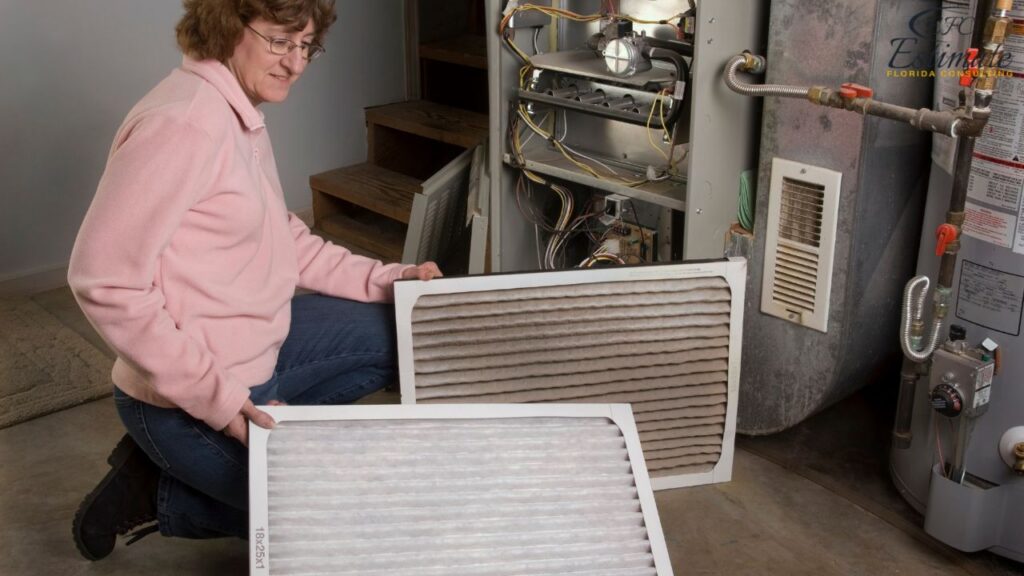
Improved Indoor Air Quality:
High-quality air filters significantly improve indoor air quality by capturing a wide range of airborne contaminants, including dust, pollen, mold spores, pet dander, and bacteria. This improved air quality is particularly beneficial for individuals with allergies, asthma, or other respiratory conditions. Clean air also contributes to overall comfort, making indoor spaces more pleasant to live and work in. By investing in air filters with higher efficiency ratings, you can create a healthier environment for your family, employees, or customers, reducing the risk of health issues related to poor air quality. Additionally, improved air quality can enhance the overall well-being and productivity of occupants, making it a worthwhile investment for any property.
Extended System Lifespan:
Proper installation and regular replacement of air filters can significantly extend the lifespan of your HVAC system and other filtration equipment. Filters that are clean and effective help prevent dust and debris from accumulating on critical system components, reducing the likelihood of breakdowns and costly repairs. A well-maintained system that operates efficiently is less likely to experience wear and tear, ensuring that it remains reliable and effective for many years. By investing in regular filter replacement, you can protect your investment in your HVAC system, reducing the total cost of ownership and avoiding the need for premature replacements or extensive repairs.
Download Template For Air Filters Project Breakdown
- Materials list updated to the zip code
- Fast delivery
- Data base of general contractors and sub-contractors
- Local estimators

Conclusion
Accurate cost estimation is the foundation of a successful air filter installation or replacement project. Estimate Florida Consulting provides comprehensive and precise estimate services that help you plan and execute your project with confidence. By understanding the cost components and potential variables, you can make informed decisions that align with your budget and project goals. Contact us today to get started with your air filters cost estimator services, and take the first step toward creating a clean, efficient, and cost-effective HVAC system. With our expert guidance and detailed cost breakdowns, you can be assured that your project will be completed on time, within budget, and to the highest standards of air quality and performance. Our commitment to excellence ensures that every aspect of your project is handled with the utmost care and professionalism, resulting in an air filtration system that not only meets your needs but also enhances the overall health and efficiency of your property.
FAQs
The cost of air filters is influenced by several factors, including the type of filter (e.g., fiberglass, pleated, HEPA), the filter size, its efficiency rating (MERV, MPR, or FPR), and whether the filter is standard or custom-sized. Installation costs can vary depending on the complexity of the HVAC system and whether any adjustments are needed to accommodate higher-efficiency filters.
The cost of installing new air filters in an HVAC system typically ranges from $130 to $650, depending on the type of filter and the complexity of the installation. This price includes the cost of the filter and the labor required for installation, with additional costs for any modifications needed to the HVAC system.
Replacing air filters generally costs between $65 and $390, depending on the type of filter and the number of filters being replaced. Regular filter replacement is essential for maintaining good indoor air quality and HVAC system efficiency.
based on the type:
- Fiberglass Filters: $6.50 – $13 per filter
- Pleated Filters: $13 – $39 per filter
- Electrostatic Filters: $26 – $78 per filter
- HEPA Filters: $65 – $130 per filter
- Carbon Filters: $19.50 – $65 per filter
- Washable Filters: $26 – $78 per filter
- UV Filters: $97.50 – $195 per filter
Higher-efficiency air filters, such as HEPA or electrostatic filters, offer superior air quality by capturing smaller particles, including allergens, dust, and bacteria. While these filters are more expensive, they provide better protection for individuals with respiratory conditions and can enhance the overall comfort and health of your indoor environment.
The frequency of air filter replacement depends on the type of filter and the air quality in your environment. Fiberglass filters should be replaced every 30 days, while pleated filters typically last 60 to 90 days. The cost of replacement filters ranges from $65 to $390 per year, depending on the type and number of filters used.
In addition to the cost of the filters and installation, you should consider additional expenses such as regular filter maintenance ($65 – $195 per year), potential energy consumption increases with higher-efficiency filters ($26 – $130 per year), and any necessary adjustments to the HVAC system ($260 – $1,300). Investing in air quality monitoring devices and extended warranties or service plans may also add to the overall cost.
The size of the air filter affects its cost, with standard sizes (e.g., 16×20) costing between $5 and $30 per filter. Larger filters (e.g., 20×30) range from $10 to $50, while custom-sized filters can cost $20 to $100 or more. Larger or custom filters offer more surface area for filtration but can be more expensive.
A whole-house air filtration system provides comprehensive air purification throughout your home, using multiple stages of filtration, including HEPA and carbon filters. These systems are ideal for homes with individuals who have allergies or respiratory conditions. The cost for a whole-house system ranges from $1,950 to $9,750, depending on the complexity and size of the installation.
Estimate Florida Consulting offers expert cost estimator services that help you plan and execute your air filter installation or replacement project with precision. We provide detailed cost breakdowns, ensuring that your project stays within budget while meeting all air quality and performance standards. Our services allow you to make informed decisions and achieve the best results for your air filtration needs.
Google Reviews



Process To Get The Air Filters Cost Estimate Report
Here I am going to share some steps to get the air filters cost estimate report.
-
You need to send your plan to us.
You can send us your plan on info@estimatorflorida.com
-
You receive a quote for your project.
Before starting your project, we send you a quote for your service. That quote will have detailed information about your project. Here you will get information about the size, difficulty, complexity and bid date when determining pricing.
-
Get Estimate Report
Our team will takeoff and estimate your project. When we deliver you’ll receive a PDF and an Excel file of your estimate. We can also offer construction lead generation services for the jobs you’d like to pursue further.

